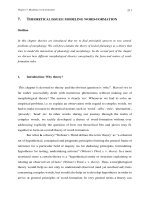Latin Word Roots
Bạn đang xem bản rút gọn của tài liệu. Xem và tải ngay bản đầy đủ của tài liệu tại đây (145.22 KB, 19 trang )
P
refixes and suffixes attach to word roots—the base parts of
words that typically convey the bulk of their meaning. The more
word roots you know, the more you will be able to determine the mean-
ing of unfamiliar words and the better you will understand words you
already know. This chapter reviews common Latin word roots. Before
you begin learning and reviewing Latin word roots, take a few minutes to
take this ten-question Benchmark Quiz. These questions are similar to the
type of questions that you will find on important tests. When you are fin-
ished, check the answer key carefully to assess your results. Your Bench-
mark Quiz analysis will help you determine how much time you need to
spend on this area as well as the specific words you need to learn in order
to increase your vocabulary power. A complete list of the vocabulary
words used in this lesson is provided at the end of the chapter.
Latin Word Roots
4
60
LATIN WORD ROOTS
61
BENCHMARK QUIZ
For each question below, use the Latin word root to determine the mean-
ing of the italicized word.
1. An amiable person is:
a. talkative, loud.
b. truthful, honest.
c. highly educated.
d. friendly, good natured.
e. full of life, energetic.
2. A lucid argument:
a. is very clear and intelligible.
b. is loosely held together, tenuous.
c. frequently digresses.
d. errs repeatedly in its logic.
e. assigns blame to others.
3. A complacent person:
a. frequently makes mistakes, but does not accept responsibility.
b. likes to pick fights.
c. is contented to a fault, self-satisfied.
d. is known to tell lies, embellish the truth.
e. is full of life, vivacious.
4. To exacerbate a problem means:
a. to solve it.
b. to analyze it.
c. to lessen it.
d. to worsen it.
e. to ignore it.
5. To measure the veracity of something is to measure its:
a. value or worth.
b. truthfulness.
c. weight.
d. circumference.
e. life force.
JUST IN TIME VOCABULARY
62
6. Something that is eloquent is:
a. dull, trite, hackneyed.
b. expressed in a powerful and effective manner.
c. very old, antiquated.
d. not fit for consumption, inedible.
e. equally divided or apportioned.
7. To indict someone is to:
a. pick a fight with that person.
b. stop or block that person from doing something.
c. harm that person.
d. charge that person with a crime.
e. love that person dearly.
8. A quiescent place is:
a. very isolated.
b. tumultuous, chaotic.
c. harmful, dangerous.
d. sacred.
e. still, at rest.
9. A noxious odor is:
a. harmful.
b. unscented.
c. tantalizing.
d. refreshing.
e. nostalgic.
10. A person with equanimity:
a. has a violent temper.
b. is very stubborn.
c. enjoys the company of others.
d. is even-tempered and composed.
e. is guilty of wrongdoing.
BENCHMARK QUIZ SOLUTIONS
How did you do on identifying Latin word roots? Check your answers here,
and then analyze the results to figure out your plan of attack for mastering
this topic.
LATIN WORD ROOTS
63
◗
Answers
1. d. The root am means love. Amiable means friendly and agreeable;
good natured, likeable, pleasing.
2. a. The root luc/lum/lus means light. Lucid means very clear, easy to
understand, intelligible.
3. c. The root plac means to please. Complacent means contented to a
fault; self-satisfied (pleased with oneself).
4. d. The root ac means sharp, bitter. To exacerbate means to make
worse; to increase the severity, violence, or bitterness of.
5. b. The root ver means truth. Veracity means truth, truthfulness.
6. b. The root loc/log/loqu means word, speech. Eloquent means
expressed in a powerful, fluent, and persuasive manner.
7. d. The root dic/dict/dit means to say, tell, use words. To indict means
to formally accuse of or charge with a crime.
8. e. The root qui means quiet. Quiescent means inactive, quiet, at rest.
9. a. The root nec/nic/noc/nox means harm, death. Noxious means
unpleasant and harmful, unwholesome.
10. d. The root equ means equal, even. Equanimity means calmness of
temperament, even-temperedness; patience and composure,
especially under stress.
BENCHMARK QUIZ RESULTS
If you answered 8–10 questions correctly, well done! You are already skilled
at using Latin word roots to determining meaning. Give the lesson a quick
review and do the practice exercise. If your score on the practice test is
equally high, move on to Chapter 5.
If you answered 4–7 questions correctly, you are familiar with some of
the most common Latin word roots and how to use them to determine
meaning. But you need more practice to really sharpen this skill. Be sure to
set aside some time to carefully review the complete list of common Latin
word roots located in Appendix A.
JUST IN TIME VOCABULARY
64
If you answered 1–3 questions correctly, perhaps it has been some time
since you reviewed word roots. Study the lesson that follows carefully, and
do the practice quiz on a separate sheet of paper so that you can do the exer-
cise several times if necessary. Take extra time to learn the complete list of
common Latin word roots located in Appendix A.
JUST IN TIME LESSON—LATIN WORD ROOTS
Just as many Americans have their roots in other countries, so, too, do many
of the words in the English language. In fact, most English words have been
borrowed from other languages throughout the centuries, and it is com-
posed largely of words built upon root words from other cultures. The two
most important categories of roots to learn are Latin and Greek because so
many English words are built upon Latin and Greek word bases. For exam-
ple, manual and manufacture share the Latin root man, meaning hand;
anonymous and synonym share the Greek root nom/nym, meaning name.
Needless to say, the more roots you know, the stronger your vocabulary
will be. As you break down unfamiliar words into their parts, you will be more
likely to recognize the roots and therefore more accurately determine mean-
ing. You will also have a better understanding of the words you already know.
GLOSSARY
ETYMOLOGY
the history of a word, the study of its origin and development
On occasion, Latin and Greek roots are themselves words. The Latin
roots err and pug, for example, are English words as well, meaning to make
a mistake and a boxer, respectively. But most of the time, roots are the base
to which prefixes and suffixes (and sometimes other roots) are attached to
create a rich variety of meaning. Take, for example, the Latin root
ced/ceed/cess, meaning to go, yield, stop. Notice how many different words
can be created by adding different prefixes and suffixes to this root and how
the different prefixes and suffixes change meaning:
antecedent: that which precedes or comes before
cessation: a stopping, a bringing to an end
concede: to acknowledge or admit as true, proper, etc. (often with
reluctance); to yield, surrender
concession: the act of conceding or yielding; a thing yielded, an
acknowledgement or admission
exceed: to extend beyond or outside of; surpass
precede: to come or go before in time, place, rank, or importance
predecessor: one who precedes or comes before another in time (as in
holding an office or position)
LATIN WORD ROOTS
65
proceed: to go forward or onward, especially after an interruption;
move on, advance
procedure: the act or manner of proceeding; a course of action or con-
duct; process
Thus, recede means:
a. to go forward blindly.
b. to stop or abandon before completion.
c. to move or go back, retreat.
d. to go together with others.
e. to yield to the decision of a superior.
Remember your prefixes from Chapter 3. Re- means back, again; ced
means to go, yield, stop. Recede means c, to move back, withdraw, retreat.
Now add the noun suffix -sion, meaning the act or state of, and you get:
recession: the act of withdrawing or going back
With your knowledge of prefixes and suffixes, you can also answer this
question:
Incessant means:
a. traveling to many places or locations, itinerant.
b. not stopping, continuing without interruption.
c. to move or go below the surface, subliminal.
d. going between, through, or among; not direct.
e. yielding readily under pressure.
The correct answer is b. The prefix in- means not; cess means to go, stop,
or yield; and the suffix -ant means being in a state or condition of; per-
forming or causing an action. Thus, incessant means continuing without
interruption; ceaseless, continuous.
Here are several words formed from another Latin root, plac, meaning
to please. Again, notice the rich variety of meaning created by adding dif-
ferent prefixes and suffixes to the root word:
placate: to appease, pacify; to allay the anger of, especially by making
concessions
implacable: incapable of being placated or appeased; inexorable
placid: calm and peaceful; free from disturbance or tumult
complacent: contented to a fault; self-satisfied, unconcerned
placebo: an inactive, harmless substance of no medicinal value given
to patients to reassure them or to members of a control group in
experiments testing the efficacy of a drug
JUST IN TIME VOCABULARY
66
SHORTCUT: MAKE THE MOST OF
YOUR LEARNING STYLE
For many people, especially visual learners, the best way to memorize
words is to create a picture in the mind associated with that word. For
example, to remember the root pug, you might picture a pug dog in a
boxing ring, or a boxer with a pug nose. Similarly, you might picture a
stop sign with the root ced written on it instead of stop, or a yield sign
with cess instead of yield. You could also picture a traffic light for the root
ced/ceed/cess, since the colors of the traffic light correspond with the
three meanings of this root: go, stop, yield.
If you are an auditory learner, you can come up with rhymes or short
sentences to help you remember root meanings. For example, you could
try one of these sentences for the root am, meaning love:
I am love.
I love Amy.
I love ham.
Below is a list of some of the most common Latin word roots. You have
already seen some of these roots in the words from the Benchmark Quiz
and this lesson. Review the list carefully, taking note of the examples, which
once again are mostly everyday words that are already part of your perma-
nent vocabulary. A more comprehensive list of the most common Latin and
Greek word roots is located in Appendix A. After you have completed this
lesson, make sure you review the list carefully and study any roots that are
unfamiliar to you.
COMMON LATIN WORD ROOTS
ac, acr: sharp, bitter
acid (something that is sharp, sour, or ill natured), acute (extremely
sharp or severe; keenly perceptive)
am: love
amorous (inclined to love; romantic, affectionate), enamored
(inflamed or inspired by love; captivated)
bel: war
antebellum (before the war, especially the American Civil War), rebel
(to resist or defy authority)
cast, chast: cut
caste (a social class separated from others by hereditary rank, pro-
fession, etc.), chastise (to punish severely, as with a beating; to rebuke)
"









